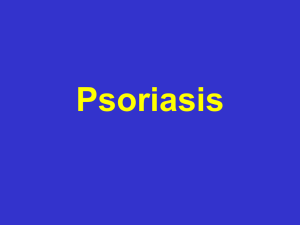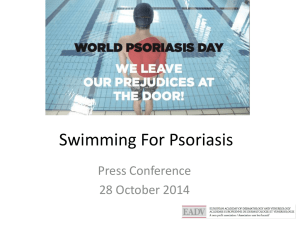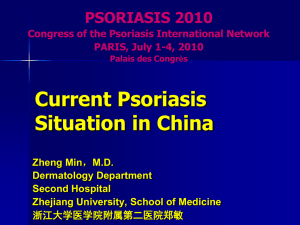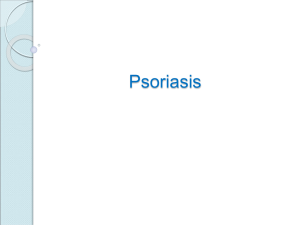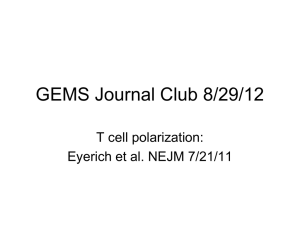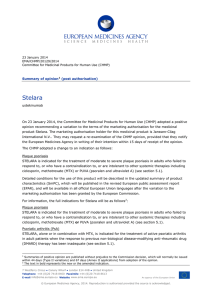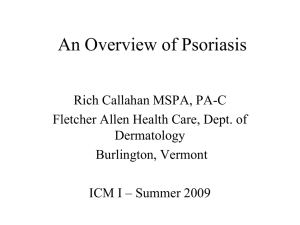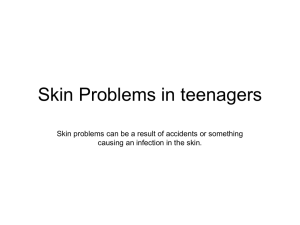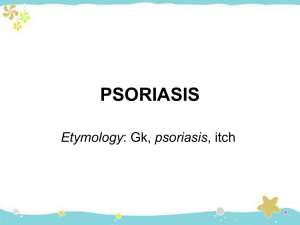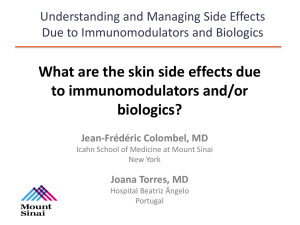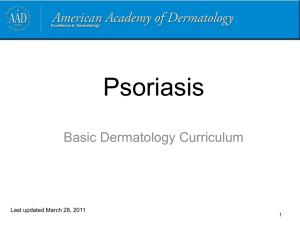Psoriasis: The New Skin (presentation)
advertisement
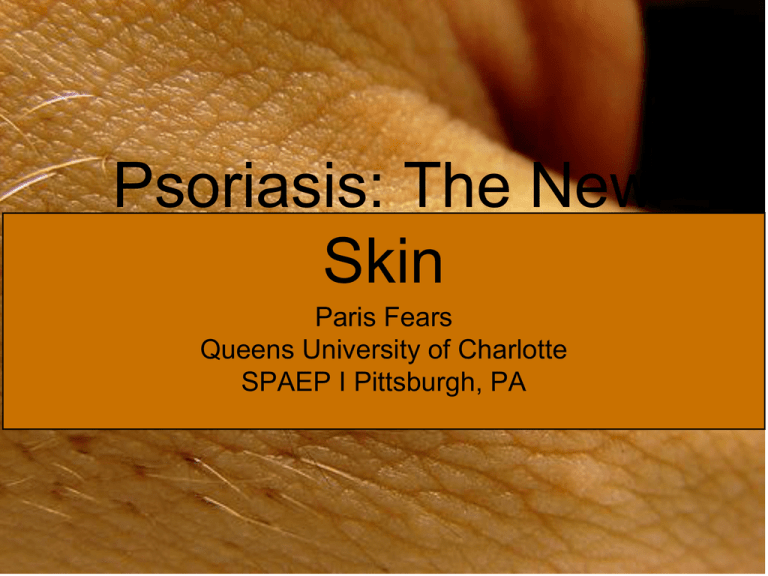
Psoriasis: The New Skin Paris Fears Queens University of Charlotte SPAEP I Pittsburgh, PA Table of Contents Introduction What is Psoriasis Background Epidemiology Genetics Physiology Quality of Life Treatments Conclusion Questions Psoriasis • ‘Psora’ means to itch in Greek • Gain an understanding of the disease, Psoriasis Questions Table of Contents Introduction What is Psoriasis Background Epidemiology Genetics Physiology Quality of Life Treatments Conclusion Questions References Psoriasis • Psoriasis, a chronic noninfectious immune-mediated inflammatory skin condition that causes thick red and flaky patches of skin • Natural Course • 5 common types Table of Contents Introduction What is Psoriasis Background Epidemiology Genetics Physiology Quality of Life Treatments Conclusion Questions References Table of Contents Introduction What is Psoriasis Background Epidemiology Genetics Physiology Quality of Life Treatments Conclusion Questions References Psoriasis • Psoriasis, a chronic noninfectious immune-mediated imflammatory skin condition that causes thick red and flaky patches of skin • Natural Course • 5 common type Plaque*-basic dry, itchy, red skin in common sites Guttate- proceeds after strep throat; numerous red scaly bumps Inverse*- occurs in excess skin folds and soft tissue Pustular- small pus filled bumps on whole body or hands and feet Erythrodermic- aggressive plaque with pain and wide patches on entire body Table of Contents Introduction What is Psoriasis Background Epidemiology Genetics Physiology Quality of Life Treatments Conclusion Questions References Psoriasis • Mistoken for 150 years • 1700’s to 1800’s Robert Willian and Jacob Plenck • 1841 Ferdinand von Hebra Table of Contents Introduction What is Psoriasis Background Epidemiology Genetics Physiology Quality of Life Treatments Conclusion Questions References Psoriasis • 7.5-8.5 million • 125 million • 150,000 • <400, >400 • Everyone is at risk Table of Contents Introduction What is Psoriasis Background Epidemiology Genetics Physiology Quality of Life Treatments Conclusion Questions References •40% increase in risk of contracting Psoriasis with "familial tendency" •Identical Twins incidence Table of Contents Introduction What is Psoriasis Background Epidemiology Genetics Physiology Quality of Life Treatments Conclusion Questions References Psoriasis • Psoriasis triggers • Stress • Little Sun Light • Injury to skin • Medication • Immune system deficiencies Table of Contents Introduction What is Psoriasis Background Epidemiology Genetics Physiology Quality of Life Treatments Conclusion Questions References Psoriasis Table of Contents Introduction What is Psoriasis Background Epidemiology Genetics Physiology Quality of Life Treatments Conclusion Questions References Psoriasis Psoriasis Table of Contents Introduction What is Psoriasis Background Epidemiology Genetics Physiology Quality of Life Treatments Conclusion Questions References • $1.6 billion to $4.3 billion dollars • 75% believe in negative impact • Comorbidities • • • HIV CVD Obesity and Alcohol Abuse Table of Contents Introduction What is Psoriasis Background Epidemiology Genetics Physiology Quality of Life Treatments Conclusion Questions References Psoriasis • Controlled not Cured • Topical treatments • Home remedies • Pills • Alternative treatments Summary Table of Contents Introduction What is Psoriasis Background Epidemiology Genetics Physiology Quality of Life Treatments Conclusion Questions References • • • • • Prevalent in all genders races, and ages 3-95 Effects about 125 million people worldwide Complex auto-immune inflammatory skin condition which includes, white scaly and raised red lesions Triggers include anything from bacterial and viral infection to stress The exact schematics to cure this disease are still a mystery Table of Contents Introduction What is Psoriasis Background Epidemiology Genetics Physiology Quality of Life Treatments Conclusion Questions References QUESTIONS? Table of Contents Introduction What is Psoriasis Background Epidemiology Genetics Physiology Quality of Life Treatments Conclusion Questions References References • Babu, Hanish. "History of Psoriasis.” General Medicine (suite 101) (2008): n. pag. Web. 17 Jul 2011. http://www.suite101.com/content/history-of-psoriasis-a85546. • Bhosle, Monali J, Amit Kulkarni, Steven R Feldman, and Rajesh Balkrishnan. "Quality of life in patients with psoriasis." Health and Quality of Life Outcomes 4.35 (2006): Web. 17 Jul 2011. http://www.hqlo.com/content/4/1/35>. • Kurian, Anil, and Benjamin Barankin. "Current Effective Topical Therapies in the Management of Psoriasis." Skin Therapy Letter 16.1 (2011): 4-7. Web. 26 Jun 2011.http://www.skintherapyletter.com/2011/16.1/2.html. • Schön, Michael P, and W.-Henning Boehncke. "Psoriasis." N Engl J Med 352. (2005): n. pag. Web. 17 Jul 2011. http://www.nejm.org/doi/full/10.1056/NEJMra041320#t=article.
